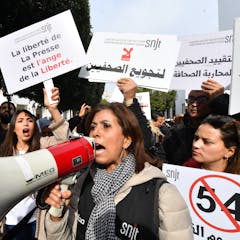
Articles on Arab Spring
Displaying 1 - 20 of 152 articles

Jordan’s foreign policy has landed the kingdom in hot water.

The first Arab woman nominated for two Oscars, Kaouther Ben Hania is a visionary and a feminist.

Throughout If We Burn, Vincent Bevins shows that “movements that cannot speak for themselves will be spoken for”.

From the Arab Spring to the Belarus Awakening and the ongoing Iranian protest Women, Life, Freedom, female-centered imagery and social media are battlegrounds of resistance and oppression.

Freedom of expression was the one remaining gain of Tunisia’s 2011 revolution, but it is now severely threatened by a populist president.

Political protests in Kenya have become insular, sectarian, tribal and unashamedly personality driven.

Football provides a way for unpopular elites to build political capital – but also creates space for citizens to voice dissent.

Iranian women have often used images of actions such as singing and dancing unveiled to show what freedom means to them and to protest the Islamic Republic’s gender oppression.

The Muslim Brotherhood once held the reins of power in Egypt. Now it faces internal splits, government repression and dwindling support.

It started with the deaths of ten people in a locked-down apartment, but is not a widespread demonstration of unrest across CHina.

Tunisia’s democratic backslide demonstrates how autocrats can use constitutional cover to entrench authoritarianism.

The country is still a very different political space. It’s a noisy democracy with a free media, lots of dissenting voices, and insulting the government doesn’t carry any overt sanction.

Leaders typically spread power among their ‘rival allies’ to keep it and co-opt enough of those elites in exchange for political support.

Extreme weather is already having an influence on global food prices.

The events of the past decade in the Middle East have upended the states in the region. What will the future hold?

A second plot was planned on 9/11, but there were too few terrorists to carry it off. Twenty years later, al-Qaida and its offshoot the Islamic State group still have trouble attracting recruits.

Viewing Tunisia as an Arab Spring success story was always too simplistic.

In the ten years since the Arab Spring, the countries affected have transformed completely. Here’s how.

History tells us that the stability of a country’s security forces is key to the success or failure of a popular uprising.

Ten years after the Arab Spring, hope has given way to turmoil as Libyans have watched duelling governments and armed groups fight over the country’s oil riches. Is a new chance for peace afoot?
